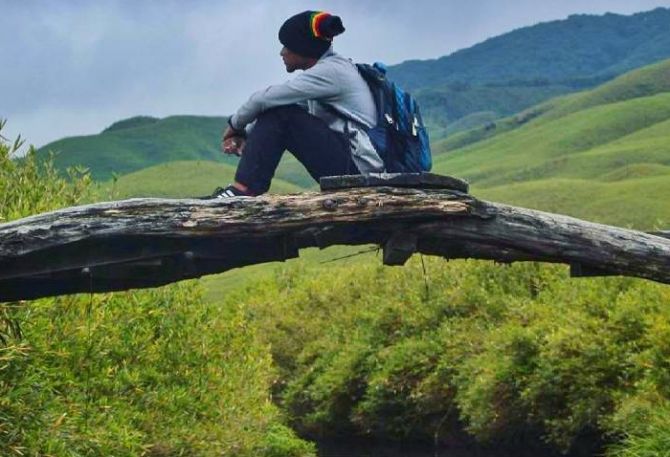Trapped in the Delhi smog, Geetanjali Krishna dreams of heading back to Dzukou Valley.

Photograph: @_chetia_parash/Instagram.
It's one of those places I've often dreamed about, especially to distract my mind from unpalatable realities such as traffic jams.
Perhaps it's been this way since I discovered that Dzukou Valley inspired one of my favourite authors Vikram Seth's ecological fable, The Elephant and the Tragopan. Or perhaps my longing for Dzukou has been fuelled over the years by the excellent pork chops at the eponymous Naga restaurant in Delhi.
Whatever be the origins of this obsession with the misty valley of flowers on the border of Manipur and Nagaland, I've found that my imagination often slips away to its forest paths, the orchids on the silver oaks and the lilies in its lush green meadows.
Oddly enough, when I actually find myself in Kohima waiting to start the trek to Dzukou Valley, my excitement is tinged with apprehension.
It's been raining incessantly for two days. What if my Shangri La turns out to be foggy, soggy or simply not the magical place of my dreams?
Morning dawns, and the rain hasn't abated.
Pooja, my trekking partner, and I don waterproof shoes, rain jackets and hoods.
I wrap my camera and binoculars in extra layers of plastic just to be safe. It's still drizzling when we find that 3 km before Viswema village, where the trekking route begins, a recent landslide has blocked the road.
We nevertheless commence the trek and our guide Lumli Naga (Li to his friends) says unconvincingly: 'This will be fun!'
A fine mist turns everything damp in seconds.
Our first ascent is steep and slippery, but thoughtfully-cut rock steps make the going easier. We take frequent breaks to remove our hoods and admire the forest vistas around us.
Giant silver oaks and pines play host to myriad orchids, ferns and mosses.
The world's tallest rhododendron trees are here, though not in bloom right now.
Pristine streams and waterfalls cross our path. Some we jump over; others afford no such option, so we have to step into the freezing waters.
My so-called waterproof shoes are soaked, but I'd be foolish to expect to stay dry in a place as wet as Dzukou!
Li has trekked to Dzukou 17 times this year. 'The weather stayed dry only on two occasions,' he says.
The landscape changes dramatically once we reach the top of the promontory, the steepest 5 km of the trek having been completed. The mountains become softer, rounder even.
A narrow, slushy trail leads through thickly-growing dwarf bamboo, Sinarundinaria rolloana. A breeze picks up as the wet bamboo brush against me.
With the rain above, puddles below and the bamboo on either side, I feel like I'm in a car wash. But what's a little more wetness to a waterlogged trekker?
Eight kilometres later, we arrive at our destination, a tiny guest house on a cliff overlooking the valley.
The guide and porter get cracking over dinner (Naga-style chicken, dal and rice), while we relax by the fire.
A local legend says when lovers go to Dzukou, the night becomes bright as day and the moon shines like the sun. Evidently, there are no lovers around -- it's wet and windy, so we pitch our tent inside the dormitory and fall into dreamless slumber.
The next day dawns clear.
We wander, as if in a daze, watching the mist veil and unveil the landscape. There's enchantment in the cool air, an otherworldly charm.
The views of the valley are spectacular. I feel as though I can spend a lifetime watching the clouds play tantalising hide-and-seek in its green depths.
The mist rises and falls in magical formations.
Thousands of butterflies flit among the wildflowers and giant, prehistoric ferns, while below the river gurgles incessantly.
Locals believe that the spirits of the dead travel along its banks -- it's easy to imagine that heaven is just round the corner.
Too soon, it's time to start the trek back, and we return with a bit of Dzukou in our hearts as well as in our well-muddied gear.
The next thing I know is I'm back in traffic-jammed Delhi. I close my eyes and find myself back in Dzukou's misty and now-familiar meadows. In a trice, the cars, noisy horns and pollution fade, and I realise that I may have left Dzukou far behind, but memories of the valley won't leave me anytime soon.
- The starting point of the Dzukou Valley trek is accessed by a 25-km drive from Kohima, where guides, porters and camping equipment can be easily hired.
- The actual trek ranges from easy to moderate intensity.
- Waterproof shoes and hiking gear are essential.











